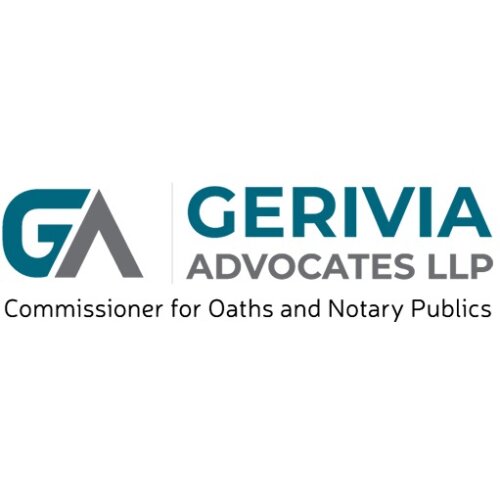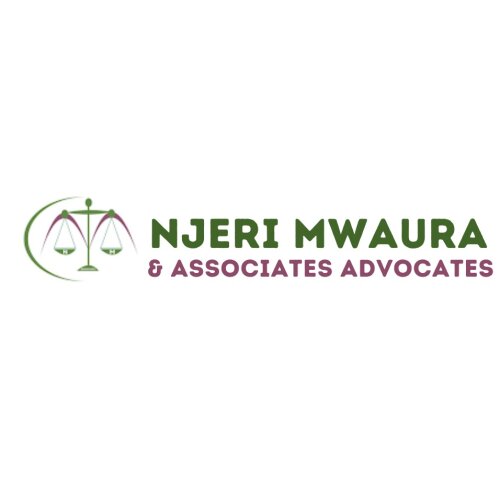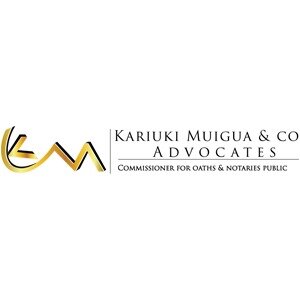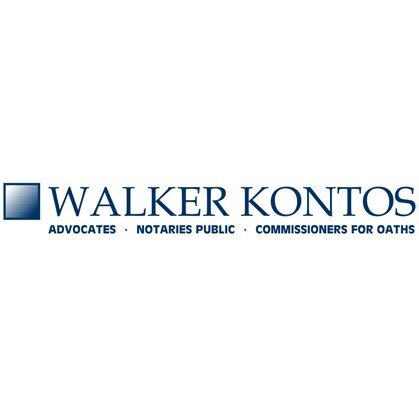Best Brokerage Lawyers in Kenya
Share your needs with us, get contacted by law firms.
Free. Takes 2 min.
Free Guide to Hiring a Real Estate Lawyer
Or refine your search by selecting a city:
List of the best lawyers in Kenya
About Brokerage Law in Kenya
Brokerage law in Kenya is centered on the regulation and supervision of brokers in various sectors, such as insurance, real estate, and financial markets. The brokerage industry plays a crucial role in facilitating transactions between buyers and sellers, ensuring fair practices, and maintaining public trust in the market. In Kenya, the Capital Markets Authority (CMA) and the Insurance Regulatory Authority (IRA) are the primary regulatory bodies overseeing brokerage activities. These bodies ensure compliance with the law, prevent fraud, and protect the interests of consumers by setting clear standards and regulations for brokerage operations.
Why You May Need a Lawyer
There are several scenarios where it might be crucial to seek legal advice in brokerage contexts in Kenya:
- Disputes: Conflicts between brokers and clients, such as breach of contract or misrepresentation.
- Regulatory Compliance: Ensuring adherence to local laws and regulations to avoid penalties or legal actions.
- Complex Transactions: Navigating through complicated transactions like mergers or acquisitions which might require a broker's assistance.
- Licensing Issues: Assisting brokers in obtaining and maintaining the necessary licenses for legal operation.
- Fraud Prevention: Protecting against fraudulent schemes or scams that may arise in brokerage practices.
Local Laws Overview
Several key aspects of local laws are significant for the brokerage sector in Kenya:
- Capital Markets Act: Regulates the securities exchange and all interactions within the capital markets, setting forth qualifications for brokers.
- Insurance Act: Governs insurance broker activities, including licensing, conduct standards, and consumer protection.
- Real Estate Regulations: Encompass licensing and operational requirements for real estate brokers to ensure transparency and fairness in property transactions.
- Consumer Protection Act: Provides protection against exploitative practices by brokers, ensuring clients receive fair treatment.
Frequently Asked Questions
What is the role of a broker in Kenya?
A broker in Kenya acts as an intermediary between buyers and sellers in various industries, facilitating transactions, offering market insights, and helping clients make informed decisions.
Do brokers in Kenya require a license?
Yes, brokers in sectors such as finance, insurance, and real estate must obtain licenses from relevant regulatory authorities to operate legally in Kenya.
How can I verify if a broker is legitimate?
To verify a broker's legitimacy, you can check their registration status with the relevant regulatory authority, such as the Capital Markets Authority or the Insurance Regulatory Authority.
What fees do brokers charge?
Brokers typically charge a commission based on the transaction value, although fee structures can vary widely depending on the industry and specific arrangements.
What should I do if I have a dispute with my broker?
If you have a dispute with your broker, it's advisable to seek legal counsel to explore your options and potentially pursue resolution through mediation or litigation.
Are brokerage agreements legally binding?
Yes, brokerage agreements are legally binding contracts, and both parties must adhere to the terms defined within the agreement. Seeking legal advice before entering into such agreements is recommended.
Can a broker act without my consent?
Brokers must act in accordance with the mandates provided by their clients, and unauthorized actions can be challenged legally.
What are the penalties for illegal brokerage activities?
The penalties for illegal brokerage activities can include fines, license revocation, and potentially criminal charges, depending on the severity of the violation.
How do I file a complaint against a broker in Kenya?
Complaints against brokers can be filed with the regulatory bodies such as the CMA or IRA, where they will be assessed and appropriate actions taken.
What protections are available for consumers in brokerage deals?
The Consumer Protection Act provides various safeguards for consumers, including fairness in dealings, transparency, and recourse options in the event of exploitation or fraud.
Additional Resources
For further assistance or information on brokerage in Kenya, consider reaching out to the following resources:
- Capital Markets Authority (CMA)
- Insurance Regulatory Authority (IRA)
- Law Society of Kenya for legal professional services
- The Kenya Property Developers Association (KPDA) for real estate-related brokerage
Next Steps
If you find yourself needing legal assistance in the field of brokerage in Kenya, consider the following steps:
- Research and contact a reputable lawyer with experience in brokerage law.
- Collect all relevant documents and evidence related to your brokerage issue to present a comprehensive case.
- Schedule a consultation to discuss your situation, ask questions, and understand your legal options.
- Consider alternative dispute resolution methods, such as mediation, if direct legal action can be avoided.
Taking these steps can help ensure that you are well-prepared and informed as you navigate any legal challenges in the realm of brokerage in Kenya.
Lawzana helps you find the best lawyers and law firms in Kenya through a curated and pre-screened list of qualified legal professionals. Our platform offers rankings and detailed profiles of attorneys and law firms, allowing you to compare based on practice areas, including Brokerage, experience, and client feedback.
Each profile includes a description of the firm's areas of practice, client reviews, team members and partners, year of establishment, spoken languages, office locations, contact information, social media presence, and any published articles or resources. Most firms on our platform speak English and are experienced in both local and international legal matters.
Get a quote from top-rated law firms in Kenya — quickly, securely, and without unnecessary hassle.
Disclaimer:
The information provided on this page is for general informational purposes only and does not constitute legal advice. While we strive to ensure the accuracy and relevance of the content, legal information may change over time, and interpretations of the law can vary. You should always consult with a qualified legal professional for advice specific to your situation.
We disclaim all liability for actions taken or not taken based on the content of this page. If you believe any information is incorrect or outdated, please contact us, and we will review and update it where appropriate.
Browse brokerage law firms by city in Kenya
Refine your search by selecting a city.

















